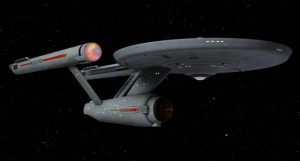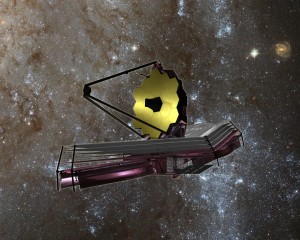It’s been almost fifty years since you ushered us onto the bridge of the starship Enterprise and led us through our Milky Way galaxy. From Aldebaran to the galaxy’s edge, we explored the Alpha quadrant, then through a wormhole to the Gamma quadrant and finally the Delta quadrant, we were at home in the galaxy.
Oh, you made it look so easy. Warping from star system to star system. Transporting down to the planet instead of landing your starship. Artificial gravity. Inertial dampers. Sub-space communications. Phasers and tractor beams. Well, we have i-Pads, Android phones and a space station in low Earth orbit. Alas, we’ve got a long way to go.
Okay, I know, it’s a science fiction show. And, it’s only been 50 years, not 300 years – which in 2265 Kirk will take command of the Enterprise for its 5-year mission. But, at the rate we’re making progress in exploring the cosmos, will we be there in another 250 years?
It’s been over fifty years since Sputnik made its first orbit of Earth and we are still mucking about trying to put unmanned rovers on and orbiters around the planets in our Solar System. We’re still lighting-off our rockets like forth of July fireworks and trying to figure out better ways to land on bodies of interest in our Solar System, from parachutes to airbags, retro-rockets and sky-crane cable-harness systems. We may as well be using “stone knives and bear skins” to build our next generation of space hardware.
Active programs like Cassini, which are producing new data every day may be on the chopping block for a reduced NASA budget to divert funds to finish development of the James Webb Space telescope – Hubble’s replacement. It’s a “rob Peter to pay Paul” deal with the ongoing NASA projects being sacrificed to support new projects. Why cut programs that are working so well? We won’t be going back to Saturn any time soon. How can we reach for the stars when we can’t even find the funding to do the meager exploring we want to do in our backwater of the galaxy?
If the JWST is over budget and behind schedule that points to a project management problem, which means that any system overhaul that needs to be done should be with NASA’s oversight on these projects. Closer attention to the planning, budgeting, development and progress of these projects, especially one with such a high profile as the JWST should have shown signs of trouble and been dealt with early on when these issues were easier to manage.
But, this is just the tip of the iceberg. We have bigger problems to address.
We have a long way to go before we will be able to venture out into our Solar System with any regularity – let alone our galaxy. Yet, we are cutting funding to the programs that we need to keep developing technology that will allow us to explore the cosmos, not to mention help cure some of the problems we have on our planet. These aren’t just the programs to develop space probes but funding for the education of our children, from elementary school through college. We can’t afford to cut such a vital lifeline to the well being and future of our country or even our planet. Funding education and making it possible for everyone to learn and advance themselves is an investment in our future, no doubt about it.
The problems we face today are complex and there are no simple solutions. Economies are crumbling, educational systems are falling behind, our environment is turning against us – what more do we need to see before we realize that the world we are going to leave to our children and our grandchildren is not going to be a very nice place to live? At the very least we should prepare them with the abilities to meet these challenges head-on, which means they need the best education possible. As it is said, “knowledge is power” and we need to empower our children if they are ever going to lead us to the stars.
The world/universe Gene Roddenberry showed us in Star Trek was one where we met the challenges of technology, but more importantly, we met the challenges of different cultures working together for the best for all and in doing so we had the technology, the finances and the will to explore this amazing Universe first hand. So maybe I shouldn’t say “curse you” but “thank you” Gene Roddenberry for showing us one possibility for our future and inspiring a generation of people to pursue engineering and the sciences for their life’s work.
Yes, I know, it’s still just science fiction, but how many of today’s realities have been born in the imagination of and science fiction from people of the past? I look forward to a future where we are only limited by our imagination and our will to explore.
At the time of this writing, the Holidays are almost here, what better time for us to indulge in fantasies about world peace, harmony and the advancement of our society. Who knows, maybe the new year will see us all a bit closer to each other and a bit closer to the stars.
Happy New Year!
RC Davison



Amen ; )